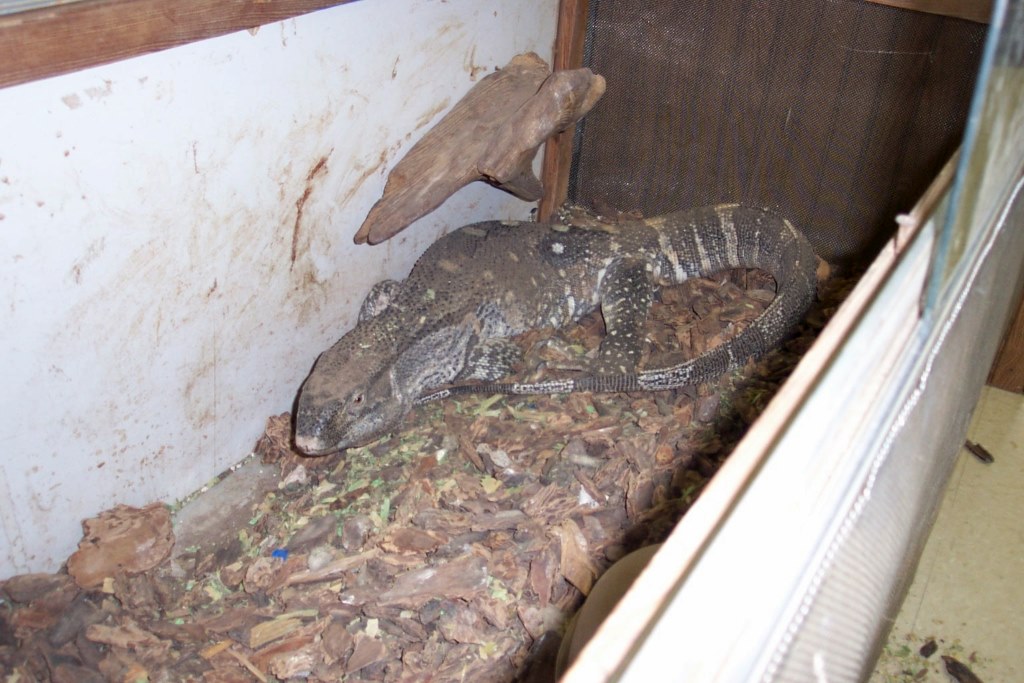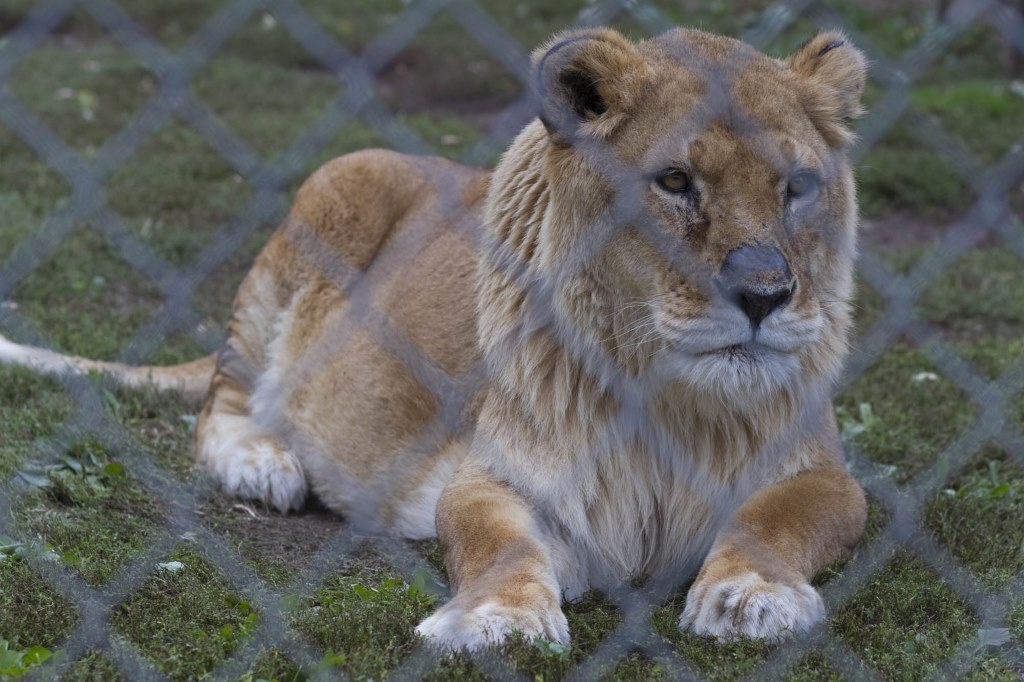Why Wisconsin’s a Magnet for Wild Animals
It's one of five states with no laws against keeping dangerous animals as pets.
Hard to care for seized animals
When bad things happen, humane officers like Weitz and Mark Hess are some of the first people to respond.
Hess has held various titles at the Waukesha Humane Animal Welfare Society for nearly four decades, and currently serves as its operations manager. In his career, he has responded to calls involving a runaway ostrich, an escaped wallaby, a primate surrendered after its owner died and a deadly spitting cobra that had bitten its owner.

A monitor lizard lies in a container after being seized by the Humane Animal Welfare Society of Waukesha in 2006. Mark Hess, HAWS’ operations manager, said the lizard and other reptiles were being kept in a one-bedroom apartment in Waukesha. They were taken to the shelter and later placed with the Chicago Herpetological Society after their owner violated his probation and was taken into custody. Photo by Humane Animal Welfare Society of Waukesha.
Weitz said although she knew she would encounter exotic, potentially dangerous animals when she became a humane officer, formal training to handle exotics was never required of or provided to her.
“All of the training I’ve had has been sought of my own volition and, sometimes, paid for at my own expense,” she said.
Weitz has concerns for police officers and others who respond to emergencies involving exotic animals.
“It’s not fair to ask our police officers, who go out every single day and potentially risk their lives in dangerous situations … to then face off against animals that can legitimately kill them,” she said.
Even if an animal is corralled, the question arises, what to do with it?
One of Hess’ most recent challenges has been finding a home for more than 300 chinchillas seized from a Waukesha home in late March. So far the Waukesha humane society has invested more than $100,000 to care for the small rodents native to South America. It is a cost the organization will likely never recoup.
Many larger, more dangerous exotics in need of a home have found refuge at Valley of the Kings, a 10-acre animal sanctuary and retreat in Sharon funded largely from donations and by the sanctuary’s president and founder, Jill Carnegie and her family and friends.

A tiger looks through the wires of its enclosure at Valley of the Kings, a sanctuary in Sharon. Large, dangerous exotics such as big cats would be included in the exotic animal ban currently being pushed by Sen. Van Wanggaard, R-Racine. Photo by Grey Satterfield IV of Curb Magazine.
Many of the animals at the sanctuary, including lions, tigers, a ti-liger (an extremely rare cross between a liger and a tiger), wolf hybrids, bears, foxes and bobcats, were abandoned by private owners or donated by zoos that didn’t have room to house them. Others were seized by the government or the state Department of Natural Resources or discovered in drug raids, Carnegie said.
Kubwa, a male tiger weighing over 1,000 pounds, was dropped off at the sanctuary when he was four months old and weighed 60 pounds, Carnegie said. She believes the owner had to give him away because a local ordinance banned ownership of big cats and the tiger had begun to wreck the owner’s home.
And Lena, a dainty female tiger, was one of a dozen big cats taken from an ex-circus trainer hoarding them in 4-foot by 5-foot, tarp-covered crates whose locks had rusted shut in his Indiana home, Carnegie said.
Andy Carlson, who has been volunteering at Valley of the Kings for over 20 years, said when Lena finally worked up the courage to venture out of her crate at the sanctuary, she stared upward, fascinated by the sky. She had never seen it before.

This baboon in a reinforced dog kennel at the Dane County Humane Society was surrendered by a Madison man in 2011. Some advocates say Wisconsin’s lax exotic pet laws encourage ownership of animals unsuitable for domestic life. Photo by Steve Apps of Wisconsin State Journal.
Hess said many of his cases end in tragedy for the animals. Euthanasia is used as a last resort when a home cannot be found for an animal. Sometimes that’s the only choice if a dangerous animal is a public health or safety risk, he said.
“Oftentimes, communities don’t even think about these situations until one happens, and then they’ll scramble and find out they have nothing on the books,” he said, adding that animals are the main victims when regulations are lax.
Communities regulate some animals
While there is no statewide ban on exotics, some municipalities have passed legislation on their own to ban certain types of animals within their borders.
Janesville, for instance, prohibits any “wild, exotic, and/or vicious pets including raccoons, any pigs, and poisonous or constricting snakes such as pythons or boas.” Ferrets and non-poisonous or non-constricting snakes are not included in the ban.
An effort to extend such a ban statewide has failed to gain traction in the Legislature.
In January 2014, Rep. Warren Petryk, R-Eleva, and a half-dozen other state representatives authored Assembly Bill 703. It sought to prohibit “the possession, propagation, and sale of dangerous exotic animals,” including lions and tigers, nonnative bears, various primates and crocodilians, including alligators, crocodiles and caimans.
Under AB 703, those who already owned animals would be grandfathered in, as long as they registered their pets. They would also be required to notify authorities if their animal escaped. Veterinarians and other professionals who have been formally trained to handle wildlife would have been exempt from the law.
This year Sen. Van Wanggaard, R-Racine, is pushing another bill, not yet introduced, to ban ownership of dangerous exotics. Wanggaard said in a memo to other legislators the bill is in response to the search for the Milwaukee “lion” and a 2013 incident in which police and the Racine Zoo discovered rattlesnakes, alligators, crocodiles, a snapping turtle and a Gila monster in a Kenosha home, the Associated Press reported.
Leahy said her organization hopes lawmakers pass the bill before something bad happens, adding, “Ohio finally passed a law after a suicidal man released nearly 50 big cats, bears, primates and wolves in Zanesville.”
Possible ban raises concern
But some in the industry worry a ban could result in legislation prohibiting the ownership of even common household pets. Others have said continuing to allow the keeping of exotic pets is in the best interest of the animals themselves.
Bill Zelenski, owner and operator of the USDA-licensed Wild Bill’s Exotics in Waupaca, said he buys, sells, breeds, rents and trades “any kind of animal you can imagine.”
Having been in the industry since he was in middle school, Zelenski has contacts all over the world. The Milwaukee County Zoo is among his buyers. Zelenski said everyone he purchases animals from is licensed by the USDA, except for those who sell him reptiles and birds, which are not regulated by the USDA.
Zelenski said he is “100 percent” against stricter exotic animal laws in Wisconsin because he does not believe lawmakers have enough experience or knowledge on the subject.
However, “If they want to have animal people like myself mentor and do courses to teach people and try to regulate through our own industry … that’s great.”
Zelenski also noted that some of his captive exotics live longer than their wild peers. He currently has a 21-year-old ring-tailed lemur that recently fathered twins; ring-tailed lemurs living wild in Madagascar usually live to be 16 to 17 years old, according to the National Zoo.

This lion is one of 39 big cats currently at Valley of the Kings, a wildlife sanctuary in Sharon. Many of the animals who call the sanctuary their home have been abandoned or surrendered by private owners who kept them as pets. Some experts believe the “lion-like” creature seen roaming around Milwaukee may be someone’s escaped pet. Photo by Grey Satterfield IV of Curb Magazine.
Cindy Steinle, owner of Small Scale Reptile Rescue in Milwaukee, said her local exotic reptile community tries to self-regulate so that irresponsible owners are admonished by their peers. Steinle said it is unfair for legislators to “lump (reptiles) in” with exotic mammals in statewide bans because they are popular, conventional pets.
If a ban were to be passed, Steinle believes both the humans and animals would suffer, especially if existing pets are not grandfathered in.
“Depending on the reach of this ban in respect to keeping reptiles as companion animals, many families will find themselves forced to have their pets killed in order to comply with the law, as rescue groups like mine will be overwhelmed with the number of pets who are suddenly homeless,” she said.
But some pet reptiles are far from harmless.
Weitz recalled one incident she responded to in early 2012 when officers in Chippewa County needed help rescuing a 22-foot-long, female Burmese python in a wooden box uncovered during a police search. Weitz, the only one on the scene who was trained to handle reptiles and amphibians, said the python could have struck and killed her in a matter of seconds.
After heaving the snake into a pillowcase, Weitz brought her to a nearby humane association for holding. While the snake rested and warmed up, Weitz worked on rehoming her so she wouldn’t be on the receiving end of a lethal injection.
“She sat there looking like, ‘Now what?’ ” Weitz remembered.
The same could be asked of Wisconsin lawmakers as the latest piece of exotics legislation pends while a “lion-like” creature — likely an escaped exotic pet, Weitz said — leads authorities on a chase through Milwaukee.
“It’s just not fair that someone can move next door to my kid and keep … a tiger,” Weitz said. “If my child were to accidentally get in their yard or the tiger were accidentally to get in mine, you know, it’s not worth it.”
Portions of this story were first published in Curb, a magazine produced by University of Wisconsin-Madison journalism students. The nonprofit Wisconsin Center for Investigative Journalism (www.WisconsinWatch.org) collaborates with Wisconsin Public Radio, Wisconsin Public Television, other news media and the UW-Madison School of Journalism and Mass Communication. All works created, published, posted or disseminated by the Center do not necessarily reflect the views or opinions of UW-Madison or any of its affiliates.
Article Continues - Pages: 1 2
-
Legislators Agree on Postpartum Medicaid Expansion
 Jan 22nd, 2025 by Hallie Claflin
Jan 22nd, 2025 by Hallie Claflin
-
Inferior Care Feared As Counties Privatize Nursing Homes
 Dec 15th, 2024 by Addie Costello
Dec 15th, 2024 by Addie Costello
-
Wisconsin Lacks Clear System for Tracking Police Caught Lying
 May 9th, 2024 by Jacob Resneck
May 9th, 2024 by Jacob Resneck





















